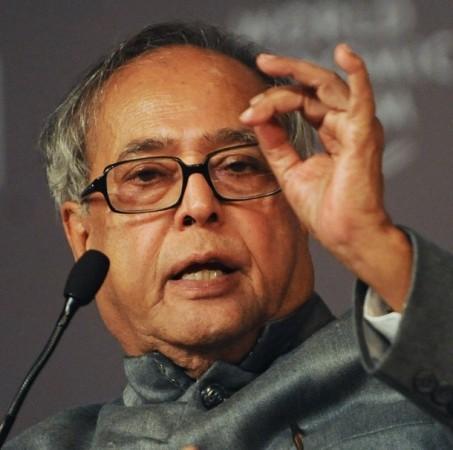
Stressing on the necessity of stating within the constitution, Finance Minister Pranab Mukherjee initiated the Lokpal Bill debate in Lok Sabha on Saturday.
Calling for an objective, dispassionate debate in Parliament Pranab Mukherjee said, "We are at a crossroads, we are being watched by everyone."
"If a consensus is arrived at after the debate, the recommendations shall be sent to the Standing Committee. The Committee will examine the recommendations for applicability and constitutionality," said Mukherjee.
The House will take up Hazare's Jan Lokpal Bill along with three other versions of the Lokpal Bill, including the one Government has already tabled in Parliament.
Stressing that the Government is in favor of a strong Lokpal he said, "The Government formed a joint drafting committee half of whose members were nominated by Hazare".
Sequencing the events Mukherjee explained, "The joint drafting committee met nine times from April 16 to June 22".
"I appeal to the MPs to use this occasion to pass the Bill without disturbing the constitutional process. I appeal to the MPs to have an objective discussion on this, try to find a solution within the constitutional frame work without harming the democratic supremacy in the matter of legislation and resolve this impasse," Pranab appealed.
"Mr Mukherjee said that of a list of 40 features, there was agreement on 34 and differences on six," reports NDTV.
Highlights of Pranab Mukherjee's speech:
Would like to again appeal to Anna to end his fast
Discussions were held to discuss the draft of the Lokpal
There is agreement on 20 of 40 basic principles put forward by government and civil society activists
BJP chief's letter in June said civil society not decision makers, Parliament must have last word
Told Team Anna no immediate commitment possible
Explained to Team Anna that we need multi-layered laws
Pranab Mukherjee said there are six major issues of divergence:
One single act be provided for both Lokpal in Centre and Lokpal state. Will state govt be willing to accept draft provisions for Lokayukta on same lines as Lokpal?
Should PM be covered by Lokpal?
Should judges of high Court and Supreme Court be brought within ambit of Lokpal?
Should conduct of MPs inside parliament be brought within purview of the Lokpal?
Should Lokpal have quasi-judicial powers?
Can all civil servants be punished and dismissed by Lokpal and Lokayuktas?
Here is a comparison of Lokpal and Jan Lokpal.
| Subjects of Issue | Jan Lokpal Bill | Lokpal Bill-2010 |
| Prime Minister | Can be investigated with permission of seven member Lokpal bench | PM can be investigated by Lokpal after s/he vacates office |
| Judiciary | Can be investigated, though high level members may be investigated only with permission of a seven member Lokpal bench | Judiciary is exempt and will be covered by a separate judicial accountability bill |
| MPs | Can be investigated with permission of seven member Lokpal bench | Can be investigated, but their conduct within Parliament, such as voting, cannot be investigated |
| Lower bureaucracy | All public servants would be included | Only Group A officers will be covered |
| Central Bureau of Investigation (CBI) | The CBI will be merged into the Lokpal | The CBI will remain a separate agency |
| Removal of Lokpal members and Chair | Any person can bring a complaint to the Supreme Court, who can then recommend removal of any member to the President | Any "aggrieved party" can raise a complaint to the President, who will refer the matter to the CJI |
| Removal of Lokpal staff and officers | Complaints against Lokpal staff will be handled by independent boards set-up in each state, composed of retired bureaucrats, judges, and civil society members | Lokpal will conduct inquiries into its own behavior |
| Lokayukta | Lokakyukta and other local/state anti-corruption agency would remain in place | All state anti-corruption agencies would be closed and responsibilities taken over by centralized Lokpal |
| Whistleblower protection | Whistleblowers are protected law | No protection granted to whistleblowers |
| Punishment for corruption | Lokpal can either directly impose penalties, or refer the matter to the courts. Penalties can include removal from office, imprisonment, and recovery of assets from those who benefited from the corruption | Lokpal can only refer matters to the courts, not take any direct punitive actions. Penalties remain equivalent to those in current law |
| Investigatory powers | Lokpal can obtain wiretaps, issue rogatory letters, and recruit investigating officers. Cannot issue contempt orders | Lokpal can issue contempt orders, and has the ability to punish those in contempt. No authority to obtain wiretaps, recruit investigating officers |
| False, frivolous and vexatious complaints | Lokpal can issue fines for frivolous complaints (including frivolous complaints against Lokpal itself), with a maximum penalty of 1 lakh | Court system will handle matters of frivolous complaints. Courts can issue fines of Rs25,000 to 2 lakh |
| Scope | All corruption can be investigated | Only high-level corruption can be investigated |













